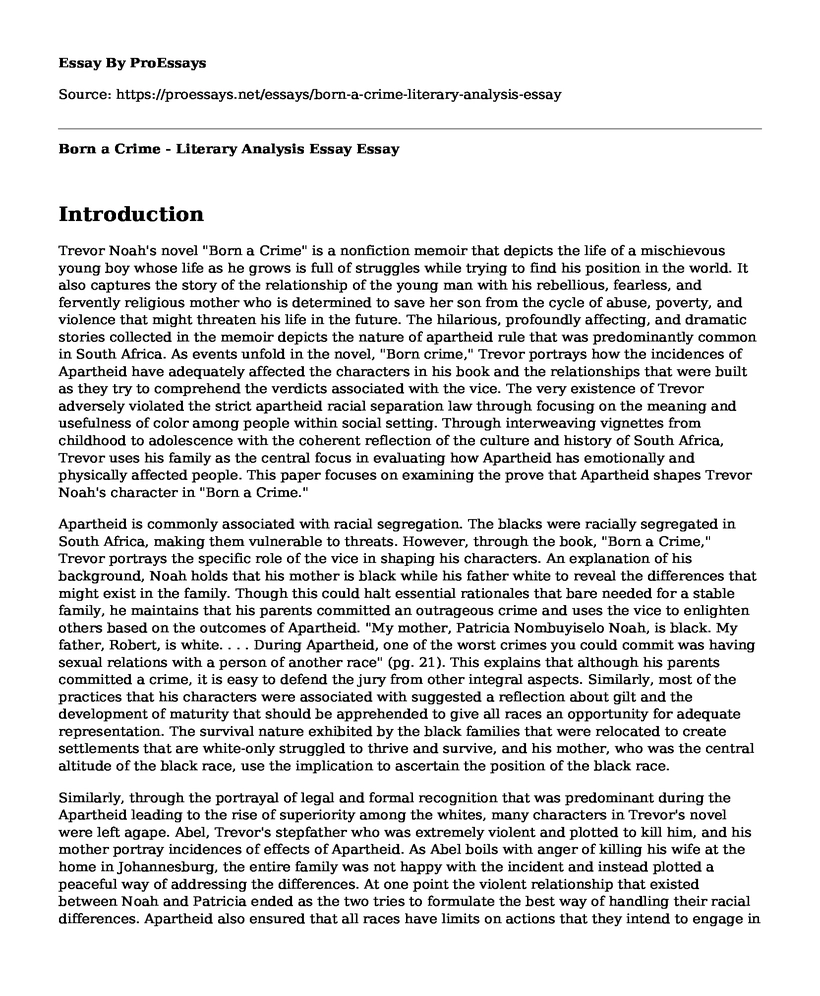Introduction
Trevor Noah's novel "Born a Crime" is a nonfiction memoir that depicts the life of a mischievous young boy whose life as he grows is full of struggles while trying to find his position in the world. It also captures the story of the relationship of the young man with his rebellious, fearless, and fervently religious mother who is determined to save her son from the cycle of abuse, poverty, and violence that might threaten his life in the future. The hilarious, profoundly affecting, and dramatic stories collected in the memoir depicts the nature of apartheid rule that was predominantly common in South Africa. As events unfold in the novel, "Born crime," Trevor portrays how the incidences of Apartheid have adequately affected the characters in his book and the relationships that were built as they try to comprehend the verdicts associated with the vice. The very existence of Trevor adversely violated the strict apartheid racial separation law through focusing on the meaning and usefulness of color among people within social setting. Through interweaving vignettes from childhood to adolescence with the coherent reflection of the culture and history of South Africa, Trevor uses his family as the central focus in evaluating how Apartheid has emotionally and physically affected people. This paper focuses on examining the prove that Apartheid shapes Trevor Noah's character in "Born a Crime."
Apartheid is commonly associated with racial segregation. The blacks were racially segregated in South Africa, making them vulnerable to threats. However, through the book, "Born a Crime," Trevor portrays the specific role of the vice in shaping his characters. An explanation of his background, Noah holds that his mother is black while his father white to reveal the differences that might exist in the family. Though this could halt essential rationales that bare needed for a stable family, he maintains that his parents committed an outrageous crime and uses the vice to enlighten others based on the outcomes of Apartheid. "My mother, Patricia Nombuyiselo Noah, is black. My father, Robert, is white. . . . During Apartheid, one of the worst crimes you could commit was having sexual relations with a person of another race" (pg. 21). This explains that although his parents committed a crime, it is easy to defend the jury from other integral aspects. Similarly, most of the practices that his characters were associated with suggested a reflection about gilt and the development of maturity that should be apprehended to give all races an opportunity for adequate representation. The survival nature exhibited by the black families that were relocated to create settlements that are white-only struggled to thrive and survive, and his mother, who was the central altitude of the black race, use the implication to ascertain the position of the black race.
Similarly, through the portrayal of legal and formal recognition that was predominant during the Apartheid leading to the rise of superiority among the whites, many characters in Trevor's novel were left agape. Abel, Trevor's stepfather who was extremely violent and plotted to kill him, and his mother portray incidences of effects of Apartheid. As Abel boils with anger of killing his wife at the home in Johannesburg, the entire family was not happy with the incident and instead plotted a peaceful way of addressing the differences. At one point the violent relationship that existed between Noah and Patricia ended as the two tries to formulate the best way of handling their racial differences. Apartheid also ensured that all races have limits on actions that they intend to engage in across their social setting. This revamps the lost trust that had been realized between the blacks and whites. "Language, even more than color, defines who you are to people" (Mezari p. 24). For instance, Patricia's former husband who beats her up in public with an old bicycle frames in front of her staff gave her an opportunity to vehemently and categorically exempt a new lifestyle and relationship with people. The revelations that were heard from Patricia cursing the husband is a sign of new dawn and perception of the world as she holds firm her race regardless of the setbacks that.
Conclusion
In conclusion, through his characters, Noah describes the nature of Apartheid in terms of interactions that were exhibited between the whites and the blacks as well as the conflicts that arose among such ethnic groups. As a principal character in the book, Noah's life was adversely shaped, and his view of things adequately changed through the moral influences that he attained from her mother. Overall, most events in the play gave rise to change perception and new focus.
Works Cited
Mezari, Aicha. "A Postcolonial Reading of Trevor Noah's (Insert born a Crime." (2018).
Noah, Trevor. Born a crime: Stories from a South African childhood. Hachette UK, 2016.
Cite this page
Born a Crime - Literary Analysis Essay. (2023, Mar 22). Retrieved from https://proessays.net/essays/born-a-crime-literary-analysis-essay
If you are the original author of this essay and no longer wish to have it published on the ProEssays website, please click below to request its removal:
- Heart of Darkness Analysis
- Comparing and Contrasting The Yellow Wallpaper and The Storm Essay
- Essay Sample on Punishment and Society
- The Grapes of Wrath Chapters Analysis Paper Example
- Mance v. Mercedes-Benz Case Study
- Essay Example on Here Come the Sun: Struggles of Life in Jamaica's River Bank
- Crime Scene Investigation: Gather, Preserve, Analyze Evidence - Free Essay Example







